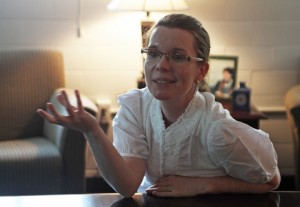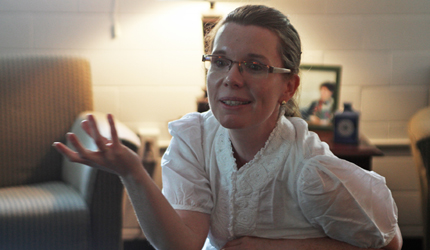
Jed Dean | Lariat Photo Editor
By Caitlin Giddens
Reporter
Hearing the statistics of 2.5 million people suffering from sex trafficking generates concern, but seeing the faces behind this number generates an unparalleled sense of urgency among students.
Baylor’s Center for Jewish Studies welcomed Dr. Victoria Fontan to speak about her experience with international human rights Wednesday.
Fontan is the director of academic development and assistant professor of peace and conflict studies at the United Nations-mandated University for Peace in San Jose, Costa Rica. She presented students with stories she witnessed and showed pictures of victims she met, bringing a sense of reality to human rights issues.
“For the past 10 years, I have tried to understand trafficking and other human rights issues,” Fontan said. “The more I know, the more red flags pop up when I travel abroad. As a scholar, it’s very difficult to get funding for these issues. I might get funding six months to one year later, and by then, everyone could be dead.”
Because she focuses on the development of insurgent groups and post-conflict areas, Fontan has witnessed human rights issues in Iraq, Afghanistan and Somalia. She said she was disturbed not only by the reality of human trafficking and female genital abuse, but also by the apathy.
“Trafficking is treated as a total non issue in Iraq,” Fontan said. “It is very shameful there to be abducted or raped. When we look at human right issues in Iraq, we see trafficking as a small issue. But Iraq is not becoming a democracy with this present.”
Working with the United Nations exposed Fontan to more than the abuse found in Middle Eastern nations.
The Council of Europe reports $4.2 billion is spent annually on international human trafficking, and the sources of this income may be surprising, Fontan said.
“I gained some exposure to trafficking because my male colleagues would go to brothels,” Fontan said. “And this was as the U.N. and UNICEF.”
Fontan said she was also disturbed by the lack of sympathy expressed for victims.
“There’s a food chain of human rights,” Fontan said. “If you’re a black African woman, forget getting help. But pictures can put a face to what I’m talking about.”
Students discussed the complexity of trafficking and other social issues, hoping to gain Fontan’s insight.
“What really impressed me about the event was Dr. Fontan’s international perspective,” Katy sophomore Kristina Miller, a member of Baylor’s International Justice Mission, said. “I have respect for people that are out trying to secure justice for these victims. But it’s disheartening to hear how far protocols and programs need to be improved.”
Fontan said in many cases, international issues are not publicized because of the negative image they may create.
“Many are worried about the bad image these issues will give Americans of the mission in Iraq and Afghanistan,” Fontan said. “There were 200 gay men killed in Baghdad just last year, and no one knows.”
Dr. Marc Ellis, professor of Jewish studies and history, also focuses on showcasing social injustices. He said he hopes students will become aware of the human rights issues present worldwide.
“We don’t talk about war or Christians going to war much at Baylor,” Ellis said. “Dr. Fontan has been to places and seen things even I never have, so Baylor was lucky to have her here.”





